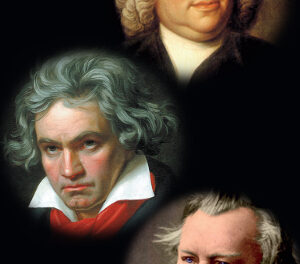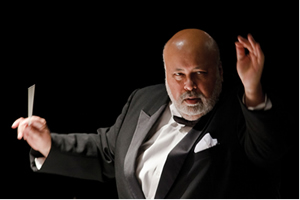There’s been chamber music of late in Cary, thanks to the Cross Currents folks, and in Greensboro, thanks to the Eastern Music Festival, but it’s been a while since Durham had a shot at music’s most intimate form, so it is perhaps no surprise that Kirby Horton Hall, on the edge of Sarah P. Duke Gardens, was packed wall-to-wall for the first of two concerts that bring Duke’s Music in the Gardens series to an end for this summer.*
The artists were Bonnie Thron, principal cellist of the NC Symphony, pianist John Noel, and clarinetist Fred Jacobowitz, who in private life is Thron’s spouse.
The program consisted of Mendelssohn’s Variations concertantes, Op. 17, Britten’s Sonata in C, Op. 65, Ginastera’s “Pampeana No. 2,” and Brahms’ Clarinet Trio, Op. 114.
All by itself, the slow movement of the Brahms would have been worth the trip and the price of admission. This was one of the most gorgeous and profoundly moving things heard in months.
But this concert offered so much more.
Along with the Variations concertantes, Mendelssohn left two sonatas and a single “Song without Words” for cello and piano – just four works. All four fit a single CD with room to spare. The Variations overflow with youthful exuberance deftly mingled with moments of profound reflection. The work was written for the composer’s brother, who did not pursue a career in music. Thron and Noel gave the music their all, and the result was captivating from start to finish.
Britten’s Sonata was written for Rostropovich, who inspired the composer in many ways, musical and otherwise. A recording by the dedicatee, accompanied by the composer, has been in print since soon after the premiere, but Thron and Noel made the work their own, quickly drawing in the audience and carrying their listeners along for the score’s 20 or so captivating minutes, after which there was prolonged and enthusiastic applause.
Ginastera’s “Pampeana No. 2” (1950), one of several folk-inspired (or -influenced) works with this title for various combinations of instruments that project his “subjective nationalism” in general terms and his fascination with the music of the Pampas – a huge area – in particular. North American listeners are often amazed by the immediate attractiveness of these inventive scores, and Thron and Noel capitalized on the music’s infectious appeal.
After the intermission, Jacobowitz joined the other two artists for Brahms’ Trio in A, Op. 114. It was one of several late works written for Richard Mühlfeld, whose playing inspired the composer to resume work at the end of his life. (This trio plus the clarinet quintet and two sonatas were the master’s last completed compositions.) One might expect that the autumnal qualities of, say, the Fourth Symphony would predominate in this Trio, and indeed the slow second movement is one of Brahms’ more introspective creations, but overall the score is quite uplifting, and hearing these three superb artists realize it was one of the highlights of the season, for sure. Jacobowitz does not perform here nearly enough, and the musical partnership he enjoys with Thron was constantly evident in the beautifully-meshed phrases of this work. Noel, too, was a strong and constant presence, proving – as he had done in the first half of the concert – that he is a pianist worthy of respect and admiration – here’s hoping we hear lots more from him!
The crowd seemed to love every minute and at the end there was clear evidence that the members of the audience were reluctant to let the musicians go.
*The last concert in this series, scheduled for July 27, is sold out, but last-minute tickets may be available at the door – would-be patrons should arrive by 6:15 p.m. for the 7:00 p.m. program being offered by pianist Jane Hawkins, violinist Eric Pritchard, and cellist Fred Raimi. For details, see our calendar.












